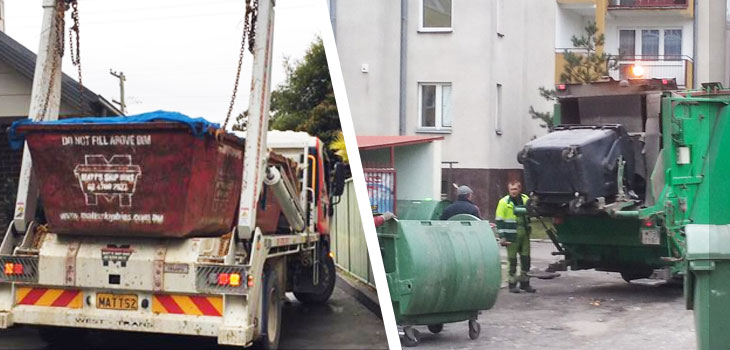Managing waste has become an increasingly critical concern in our modern world. As we strive for sustainability and environmental responsibility, the methods we choose for waste disposal can have a significant impact.
Waste management is a critical aspect of maintaining a clean and sustainable environment. As waste generation continues to rise, the methods we choose to dispose of it become paramount.
Skip bins and traditional waste collection are two prominent methods that have their own unique set of advantages and disadvantages. We'll explore the pros and cons of each approach, helping you make an informed decision that aligns with your waste management goals.
Advantages of Skip Bins
Skip bins, also known as dumpsters or containers, are large receptacles designed to hold a substantial amount of waste. They come in various sizes and are commonly used in construction sites, residential areas, and commercial spaces.
Skip bin services involve delivering an empty bin to your location, allowing you to fill it with waste, and then collecting and disposing of it once it's full.
Skip bins offer several advantages that make them an attractive option for waste disposal:
1. High Capacity
Skip bins come in various sizes, allowing you to choose one that suits your specific needs. Their high capacity is particularly beneficial for large-scale waste disposal, such as during renovations or construction projects.
2. Flexibility
You can rent a skip bin for a specific duration, giving you the flexibility to manage your waste disposal according to your timeline. This is especially useful for projects with varying waste generation rates.
3. Efficient Sorting
Some skip bin services offer sorting options, allowing you to segregate different types of waste easily. This promotes recycling and reduces the environmental impact of waste disposal.
4. Reduced Hassle
Once you fill the skip bin, the service provider will pick it up and handle the disposal process, saving you the hassle of transporting waste yourself.
Advantages of Traditional Waste Collection
Traditional waste collection, on the other hand, involves the use of municipal waste management services. This typically includes curbside pick-up of household waste, which is then transported to landfill sites or recycling centers.
This method has been in place for many years and is the default option for most residential areas.
Traditional waste collection methods also come with their own set of advantages:
1. Convenience
Curbside collection is convenient for households, as waste is regularly picked up from your doorstep, eliminating the need to transport it elsewhere.
2. Regulated Services
Municipal waste collection services are well-regulated and ensure that waste is disposed of properly, adhering to environmental guidelines.
3. Cost Savings
For individual households, the cost of waste collection is often included in local taxes, resulting in predictable expenses.
4. Community Participation
Traditional waste collection fosters a sense of community participation in waste reduction and proper disposal practices.
Impacts and Benefits of Skip Bin vs Traditional Waste Collection
Skip bins and traditional waste collection serve as pivotal solutions in waste management, each offering unique advantages and challenges that influence our choices and their implications on the environment and community.
Environmental Considerations
Both skip bins and traditional waste collection methods impact the environment differently. Skip bins can contribute to landfill waste, especially if sorting and recycling are not prioritized.
On the other hand, efficient municipal waste management systems associated with traditional waste collection can promote recycling and minimize the amount of waste that ends up in landfills.
Cost-Effectiveness
The cost-effectiveness of waste disposal varies between skip bins and traditional methods. While renting skip bins can be cost-effective for large-scale waste disposal needs, traditional waste collection is typically more cost-effective for individual households because it is often included in local services.
Convenience and Accessibility
The convenience and accessibility of each method depend on various factors. Skip bins require a dedicated space for placement, making them potentially unsuitable for certain residential areas.
Conversely, traditional waste collection, with its curbside pickup, offers high convenience and accessibility for most households.
Suitability for Different Types of Waste
In terms of waste versatility, skip bins are well-suited to accommodate a wide range of waste, including construction debris. In contrast, municipal services connected to traditional waste collection are primarily designed for household waste, positioning them as ideal for general waste disposal.
Space Requirements
Space constraints can be a deciding factor in waste management choices. Skip bins demand a significant amount of space, which can be challenging to find in densely populated areas.
Traditional waste collection, however, does not require additional space, as waste is typically placed curbside for pickup.
Regulations and Permits
Regulatory adherence is essential in waste management. Depending on the region, placing a skip bin may require obtaining permits and following specific regulations.
Traditional waste collection, being a municipal service, adheres to established regulations without the need for households to acquire additional permits.
Community Engagement and Participation
Community involvement in waste management can be influenced by the method chosen. Using skip bins might not encourage as much community participation as traditional waste reduction initiatives.
On the other hand, with traditional waste collection, community members are often actively engaged in waste reduction through recycling and appropriate disposal practices.
Choosing the Right Option for You
Ultimately, the choice between skip bins and traditional waste collection depends on your specific needs and priorities. Consider factors like the type of waste you generate, the available space, your budget, and your commitment to environmental responsibility.
When it comes to waste disposal, there's no one-size-fits-all solution. Skip bins and traditional waste collection each have their strengths and weaknesses.
By understanding the benefits of each method and evaluating them in the context of your requirements, you can make a well-informed decision that aligns with your waste management goals.
For those leaning towards hiring skip bins, consider Ezyskips Online, a reputable company in the industry. Visit their website at ezyskipsonline.com.au to explore their offerings and make an informed choice.
